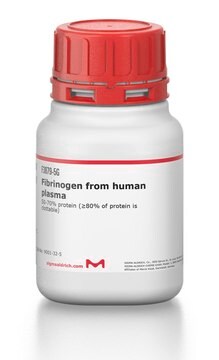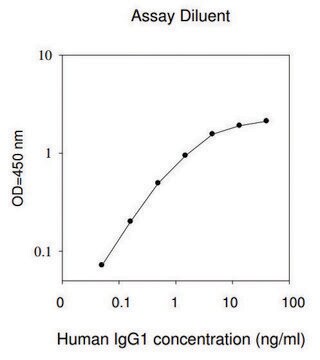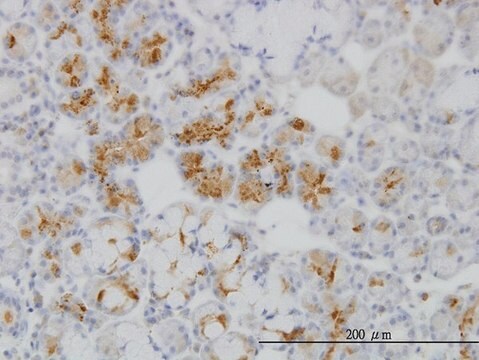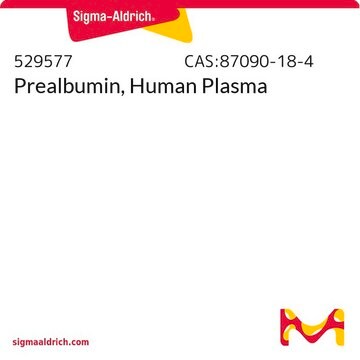R9388
Retinol Binding Protein from human urine
buffered aqueous solution
Sinônimo(s):
CRBP, Cellular retinol binding protein, RBP, RBP-1, Retinol Binding Protein I
Faça loginpara ver os preços organizacionais e de contrato
About This Item
Produtos recomendados
fonte biológica
human urine
Nível de qualidade
Ensaio
≥85% (SDS-GE)
Formulário
buffered aqueous solution
técnica(s)
cell culture | embryo: suitable
transfection: suitable
nº de adesão UniProt
Condições de expedição
dry ice
temperatura de armazenamento
−20°C
Informações sobre genes
human ... RBP1(5947)
Descrição geral
Retinol Binding Protein (RBP) is a member of lipocalin superfamily. The normal concentration of RBP in serum is 40 to 50 μg/mL and has a molecular weight of 21 kDa. It has a turnover rate of 4 to 24 h. RBP is produced in the liver in response to retinol binding trigger. It is also produced in kidney, sertoli cells of testis. RBP contains a single globular domain and a highly conserved N-terminal region. It has eight antiparallel β sheets in the centre which binds retinol. In human chromosome, the gene encoding RBP is localised at 3q23.
Aplicação
Retinol Binding Protein from human urine has been used:
- as one of the protein in microinjecting mesencephalic cavity of chicken eggs to monitor embryonic cerebrospinal fluid/embryonic serum protein transfer
- as an additive in basal medium for RNA transfection experiments
- in the antibody-derivatized affinity pipettes preparation for the capture of affinity proteins
Ações bioquímicas/fisiológicas
Inflammation induced by lipopolysaccharide (LPS) exposure caused a reduction in the level of retinol binding protein produced by the liver.
Retinol Binding Protein (RBP) is a specific protein for the transport of vitamin A. The apo-RBP, formed after delivering retinol to the tissues is catabolized by the kidney. The plasma concentration of RBP is less in diabetes mellitus patients. RBP binds to the carrier protein transerythrin, to prevent its loss during glomerular filtration. RBP is implicated in initial neurogenesis and neuroepithelial cell proliferation. RBP is responsible for blepharophimosis syndrome (BPES).
forma física
Solution in 10 mM sodium phosphate, pH 7.4, 150 mM NaCl, and 0.05% NaN3
Código de classe de armazenamento
10 - Combustible liquids
Classe de risco de água (WGK)
WGK 2
Ponto de fulgor (°F)
Not applicable
Ponto de fulgor (°C)
Not applicable
Equipamento de proteção individual
Eyeshields, Gloves, multi-purpose combination respirator cartridge (US)
Escolha uma das versões mais recentes:
Já possui este produto?
Encontre a documentação dos produtos que você adquiriu recentemente na biblioteca de documentos.
Plasma retinol binding protein: structure and function of the prototypic lipocalin
Newcomer ME and Ong DE
Biochimica et Biophysica Acta, Protein Structure and Molecular Enzymology, 1482(1-2), 57-64 (2000)
Assignment of the cellular retinol-binding protein 1 gene (RBP1) and of the coatomer beta' subunit gene (COPB2) to human chromosome band 3q23 by in situ hybridization
De Baere E, et al.
Cytogenetics and Cell Genetics, 82, 226-227 (1998)
Laboratory Tests for the Assessment of Nutritional Status, Second Edition (1999)
Vitamin A in Health and Disease, 87-95 (1994)
F J Rosales et al.
Journal of lipid research, 37(5), 962-971 (1996-05-01)
The acute inflammatory response to tissue injury and infection is associated with low concentrations of plasma retinol and its specific transport proteins, retinol-binding protein (RBP) and transthyretin (TTR). To examine the kinetics and mechanism of hyporetinemia, we have induced acute
Nossa equipe de cientistas tem experiência em todas as áreas de pesquisa, incluindo Life Sciences, ciência de materiais, síntese química, cromatografia, química analítica e muitas outras.
Entre em contato com a assistência técnica






